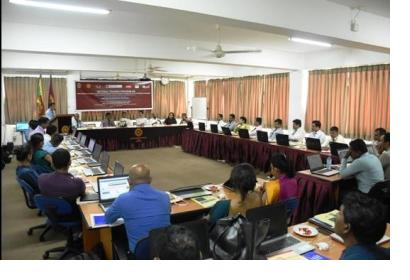At the request of the Government of Sri Lanka, through the Ministry of Disaster Management (MoDM), UN-SPIDER carried out a Technical Advisory Mission (TAM) follow-up activity to Sri Lanka to understand long-term capacity building needs and discuss joint activities in next three to five years.
As a part of this TAM follow up mission, a one day workshop was organized under the guidance of MoDM on 22 March 2018. About 30 representatives (high-level officials) from the following stakeholder organisations attended the meeting: MoDM, Disaster Management Center (DMC), National Disaster Relief Services Center (NDRSC), Department of Meteorology (DoM), National Building Research Organisation (NBRO), Department of Census and Statistics, Department of Irrigation, Department of Survey, Ministry of Environment, National Disaster Reduction Center of China (NDRCC), Asian Disaster Preparedness Center (ADPC) and the International Water Management Institute (IWMI). The mission team also met with senior officials from MoDM to discuss long term plans to support the implementation of the Sendai Framework. As a result of the 2011 UN-SPIDER TAM, Information and Communication Technology Agency (ICTA) is implementing NSDI with other Stakeholders (main stakeholders –Ministry of Disaster Management, Disaster Management Center (DMC), National Disaster Relief Services Center (NDRSC), Department of Meteorology (DoM), National Building Research Organisation (NBRO), Department of Census and Statistics, Department of Irrigation, Department of Survey, Ministry of Environment).
The UN-SPIDER team visited a landslide relic field at Kegalle District of Sri Lanka (the site of a May 2016 landslide that left 120 people dead,) where on-site briefing was provided to district level officials about emergency support mechanisms and the role of space technology. It was deemed important for MoDM and DMC to be aware of how to use the Charter and UN-SPIDER assistance effectively, not only during emergency situations, but also to improve relief and rebuilding efforts.
A national training programme on the “Application of Disaster Risk Assessment for Development Planning and Effective Emergency Response” was conducted by experts from UN-SPIDER and two regional support offices, namely: the Asian Disaster Preparedness Center (ADPC) and the International Water Management Institute (IWMI). This training was hosted in University of Peradeniya, Kandy, Sri Lanka from 26-30 March, 2018. Forty-one participants from DMC, NBRO, MoDM and NDRSC participated in the training.

